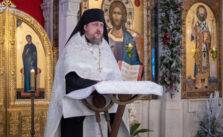In the name of the Father, the Son, and the Holy Spirit!
Today we have entered the feast of the Lord’s Baptism, or as it is called in Church lexicon, Theophany. Where did this name come from? When the Lord entered as a man into the waters of the Jordan, being baptized of John, the Holy Spirit descended upon Him in the form of a dove. During the Baptism there was the voice of the Father, saying, This is my beloved Son, in whom I am well pleased (Matthew 3:17).
Christ entered the waters of the Jordan, having taken upon Himself, according to the words of many holy fathers, the sins of those who are baptized. The Holy Trinity was revealed in the Jordan, in order to reveal to every person first of all God’s will for that person himself—how he must live in order to enter into close union with God, in order to acquire grace, which descended upon each of us in the Sacrament of Baptism. And even after His Resurrection, when he appeared to His disciples in Galilee, the Lord said to them, All power is given unto me in heaven and in earth. Go ye therefore, and teach all nations, baptizing them in the name of the Father, and of the Son, and of the Holy Ghost: Teaching them to observe all things whatsoever I have commanded you (Matthew 28:18–20).
At the divine services we hear very many hymns, and we often do not think about the fact that those who composed them were people enlightened by that same Holy Spirit. These were people who abode in an ocean of grace, they theologized, moved by the Holy Spirit.

What do we hear in the kontakion of the forefeast, with which yesterday’s cycle of services began? “O Christ, Who in Thy compassion and infinite mercy takest away the multitude of all our transgressions, Thou comest as a man to be baptized in the waters of the Jordan, clothing me in the raiment of the ancient glory of which I was stripped bare.” What is this raiment in which the Lord clothes a sinful man? Besides taking away his sins (“the multitude of all our transgressions”), Christ clothes us in a garment of incorruption—He makes us gods by grace. Through communion with Himself, according to the Apostle’s words, As many as have been baptized into Christ have put on Christ (Gal. 3:27). Christ leads us into communion with the Father and with His Holy, Good, and Live-Creating Spirit. This garment not only warms and protects us, but also arrays us in immortality, makes us participants in divine energies, divine grace. Truly, we are often not conscious of the great gifts by which God honored man in fallen Adam. He created the world and the crown of the world, a creation great and unfathomable to man—He created man himself. To each of us He has given temporal life. Here we were born, here we abide, and here we grow on this earth; and He gave us those gifts, which we are probably incapable of fully understanding. He has marked us with the gifts of the Holy Spirit in the Sacrament of Chrismation. “The Seal of the Gift of the Holy Spirit,” says the priest as he marks the person being baptized with holy chrism.
But how must we live so that this grace would remain inseparably with us, so that this raiment in which God has clothed us in the Sacrament of Baptism would not wear thin, not rot, not fall away from us? If we will mesh our will with God’s will, if we will burn with such love for our Creator and Provider that this love will spill over in abundance also upon our neighbors, if we will flee from evil in our thoughts and deeds, then the grace of the Holy Spirit, that raiment of salvation, will adorn us, instruct us, and invisibly work our salvation.
However, in speaking of grace, we need to speak also of caution with regard to that great gift the Lord gives us. In Constantinople there was once an amazing incident: Already occupied by the Turks, in Constantinople the Moslems permitted the Greeks to hold church services, albeit in a limited number of places. And so, the Turkish women, who were either Moslems or pagans, noticed that the Christian children grew to be more noble-looking than the Turkish children, were more intelligent, and an invisible light illumined their faces. So the Turkish women decided—without having faith in Christ—to take their children to church and have them baptized only so that they would be healthier and cleverer. And when the priests and bishops found out about it, they considered it sufficient reason to call a local council. At this council a resolution was passed that might shock many of us: to consider this baptism invalid, because it was done not for the sake of salvation of the soul, but for the sake of physical health.

We do the same thing when we come to Church forgetful about man’s great calling given to us by God, and asking for something insignificant. Each comes with his own vain problems and forgets about the most important thing—that this raiment spoken about in today’s hymns might warm our souls and bodies to the fullest. And then all else will fall away, because the greatness of the One to Whom we address our prayers implies the greatness of the petitions we raise to Him.
If a person comes with faith, with the sincere desire to acquire God, then God will act mightily in him. An example of this is St. Cyprian of Carthage. He writes of his life before Baptism: “Having been in the darkness of night, I sailed the sea of my life willy-nilly, without hope or support, not knowing the way, deprived of all truth and light.” He says, “Then, I considered the divine promise of mercy hard and impossible, that it was not possible to be born again, and while still alive in body to become a new man in spirit and heart. But after I had been washed clean of my impure past in the font of renewal, after I had received from on high the Spirit and become a new man, for me the doubtful became true, and the closed, open. I received the strength to do what before I thought to be difficult and impossible.”
May God grant that on this feast day each of us would commune of the grace of the All Holy Spirit! And that we might boldly say, in the words of the hymn sung on the day of the Holy Trinity-Pentecost: “Today the grace of the Holy Spirit has gathered us together.” This grace should give us the freedom that no human society can give; the strength that no physical exercises can cultivate. And we will not grow faint before the difficulties we meet on the path of salvation, because we have God as our helper, strengthening us on the path of virtue. Amen.

